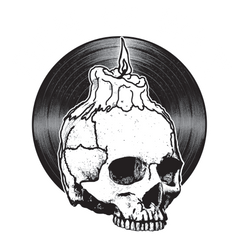Unknown Mortal Orchestra
V
Available on "Legendary" wax
Created between the dry freeways of Palm Springs, California and lush coastlines and Hilo, Hawai’i, V is the definitive Unknown Mortal Orchestra record. Led by Hawaiian-New Zealand artist Ruban Nielson, V draws from the rich traditions of West Coast AOR, classic hits, weirdo pop and Hawaiian Hapa-haole music. With his sharpest-ever ear for “making it UMO”, Ruban evokes blue skies, beachside cocktail bars and hotel pools without ever turning a blind eye to the darkness that lurks below perfect, pristine surfaces.
The road to V began in April 2019 when UMO headed to Indio, California, to perform at Coachella. For that fortnight, Ruban booked an Airbnb in nearby Palm Springs and brought his family along. Between performances, he realized the desert resort city’s palm tree-lined streets reminded him of a childhood spent playing by white hotel swimming pools with his siblings while their entertainer parents performed in showbands across the Pacific and East Asia.
A year later, Ruban started thinking about Palm Springs again as the COVID-19 pandemic loomed on the horizon. After contemplating spending lockdown at home in Portland, he purchased a house in Palm Springs. Having spent a decade touring, Ruban knew he had health issues and burnout to address. As America went into lockdown, he settled in for enforced downtime. Under the palm trees, he had the space to reflect. He felt a sense of gratitude for the lifestyle music had afforded him. The warm, dry weather cleared up his lifelong asthma issues, he found himself singing better than ever before, and new songs began to flow out of him in his home studio.
When he recorded his third album Multi-Love, Ruban incorporated disco elements into the lo-fi funk-rock dreamscapes of his first two records. Coming from a punk background where the slogan “disco sucks” had been casually thrown around, he found a subversive glee in flipping the script. On V, you can hear a continuation of this impulse in the arid disco-funk of ‘Meshuggah’. “There are two kinds of musical taste, constructed and instinctual,” Ruban said. “Taste as clout is dangerous to art, in my opinion. Then, there’s music that will send a shiver down your spine. You didn’t ask for that shiver. It just happens.”
During the pandemic’s early days, Ruban’s brother Kody had flown from New Zealand to Palm Springs to help him with his recordings. When they talked about records that moved them in that spine-shivering manner, Ruban started thinking about the ubiquitous 70s AM radio rock and 80s pop songs he remembered hearing as a child while their parents were working as entertainers. He wanted to write his version of those records, leading to the two glorious uptempo singles UMO released in 2021, ‘Weekend Run’ and ‘That Life’.
However, the golden good times never last forever. As health issues began to plague one of his Hawaiian uncles, Ruban realized he was coming face to face with a sharper, more acute sense of mortality looming. Putting his recordings aside, he helped his mother and another of her brothers move home from New Zealand and Portland to Hawai’i to be with him. As they settled in, Ruban began dividing his time between Palm Springs and Hilo on the northeastern side of the big island.
He knew that part of his connection with Palm Springs came from how it evoked aspects of his childhood. For Ruban, Hawai’i had a similar association, but it also brought back faded memories of the darker side of his parents' lifestyle. On those trips, he heard those classic AM radio rock records he’d talked about with Kody everywhere. They were inextricably intertwined with the palm trees, swimming pools, and glamorized hedonism he’d internalized since childhood.
There's a type of music in Hawai'i called Hapa-haole (Half white). You can hear it expressed in signature UMO style through the humid guitar-led atmosphere of V's penultimate song, ‘I Killed Captain Cook’. Although the songs are presented in a traditional Hawaiian manner, they're mostly sung in English. Having been influenced by Hawaiian music since UMO’s first album, Ruban saw a space for himself within the tradition. When he reflected on his success, he realized he had the responsibility and platform to represent Hapa-haole music on the global stage.
After reuniting with Kody at a cousin’s wedding in Hawai’i, the brothers traveled to Palm Springs. There, with assistance from their father, Chris Nielson (saxophone/flute) and longstanding UMO member Jake Portrait, they brought everything Ruban had been mulling over about together through the fourteen singalong anthems, cinematic instrumentals and mischievous pop songs that make up V.
“In Hawaii, everything shifted off of me and my music,” Ruban said. “Suddenly, I was spending more time figuring out what others need and what my role is within my family. I also learned that things I thought were true of myself are bigger than I thought. My way of making mischief - that’s not just me - that’s my whole Polynesian side. I thought I was walking away from music to focus on family, but the two ended up connecting.”
The first double album in the UMO discography, V, makes a strong case for itself as Ruban’s sunbleached masterpiece while simultaneously recontextualizing and enriching the journey that led him to this moment. Alongside Sonic Youth’s Daydream Nation, Pulp’s Different Class, and Prince’s 1999, it’s a breakthrough work from a mid-career artist in full control of his creative powers. Most of all, V is about having fun while making music and art that transcends clout and currency. In the process, Ruban effortlessly reclaims taste as a personal part of selfhood; in that reclamation, he propels UMO to breathtaking new creative heights.



